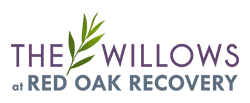Dual diagnosis, also known as co-occurring disorders, is a term used to describe people struggling with addiction and mental health disorders. It is estimated that nearly eight million people in the United States have both an addiction and another mental health condition. Unfortunately, women are more likely to experience both addiction and mental illness than men. Knowing the symptoms of dual diagnosis in women can help identify if someone is struggling with this issue and needs treatment.
If you or a loved one is exhibiting dual diagnosis symptoms or is interested in a dual diagnosis treatment program, contact The Willows at Red Oak Recovery® at 855.773.0614 today. We offer dual diagnosis services for women that are tailored to meet each client.
Why Is Dual Diagnosis Treatment Ideal?
Dual diagnosis treatment is ideal because it allows women to receive comprehensive, customized care that addresses both addiction and mental health issues. This approach can help women achieve long-term recovery by repairing the damage caused by co-occurring disorders. Additionally, dual diagnosis treatment programs provide additional support and treatment resources to help women manage any ongoing mental health issues.
Some of the benefits of dual diagnosis treatment include:
- Access to a multidisciplinary team of experts
- Support from peers in recovery
- Individualized care and treatment plans
Often, addiction issues stem from self-mediating mental health symptoms, such as depression, anxiety, or trauma. In other cases, substance abuse can trigger mental health symptoms. Regardless of the cause, dual diagnosis treatment can help women effectively address and manage their addiction and mental health struggles.
Common Dual Diagnosis Symptoms in Women
There are several different signs and symptoms of dual diagnosis in women. The most common dual diagnosis symptoms in women include:
- Depression or anxiety – These issues can be caused by an underlying mental health disorder or addiction. Depression and anxiety often worsen if left untreated.
- Low self-esteem – Many women with dual diagnosis struggle with feelings of low self-worth or worthlessness due to their mental health disorder or substance abuse problems.
- Lack of motivation – People struggling with addiction and mental health conditions often feel unmotivated due to their depression or anxiety. They may lack the energy to complete daily tasks or accomplish goals they once had for themselves.
- Social isolation – Many women who suffer from dual diagnosis feel isolated from friends, family, and society as a whole due to their struggles with addiction and mental illness. This sense of loneliness can lead to further depression, anxiety, and drug use as a form of self-medication.
- Changes in behavior – Significant changes in behavior such as aggression, impulsivity, irritability, or apathy can be warning signs of dual diagnosis in women.
If you or a loved one is experiencing these or other signs of dual diagnosis, it is important to seek help as soon as possible. Dual diagnosis treatment programs can help address both addiction and mental health disorders for women at The Willows at Red Oak Recovery®.
Discover the Benefits of a Dual Diagnosis Treatment Program at The Willows at Red Oak Recovery®
At The Willows at Red Oak Recovery®, we understand how difficult it can be for someone struggling with both addiction and a mental disorder such as depression or bipolar disorder. That’s why we offer specialized programs for women dealing with this issue. We provide comprehensive care for those suffering from co-occurring disorders using evidence-based therapies like cognitive behavioral therapy (CBT). Our program also includes the following:
- Individual counseling sessions
- Group therapy sessions
- Family therapy sessions
- Experiential therapies like art therapy and yoga therapy
- Medication management services when necessary
- Relapse prevention planning services upon completion of the program
- Aftercare support services
Please contact us by calling us at 855.773.0614 today or by filling out our secure online form. A brighter, happier future is possible.


